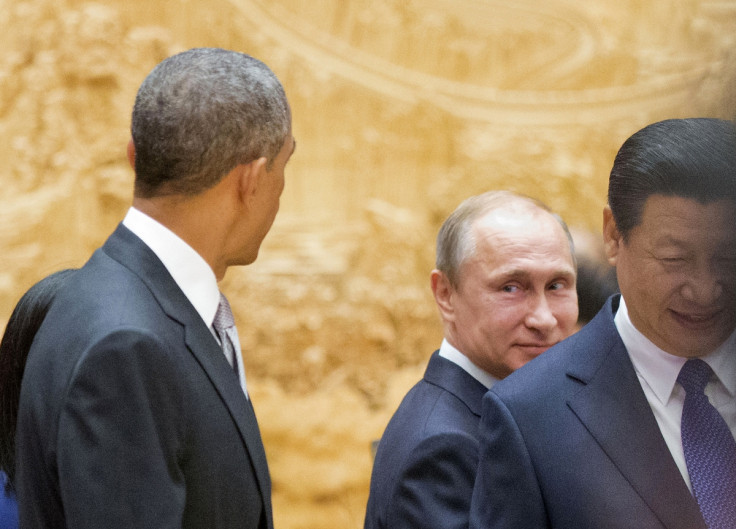Barack Obama's failures in Syria and Iraq have gifted supremacy to Vladimir Putin's resurgent Russia

The word "legacy" has been thrown around a lot in 2015 with regards to US President Barack Obama, who celebrated two major foreign policy wins with the opening of relations with Cuba and the nuclear deal with Iran.
These two achievements cannot be underplayed. America's refusal to engage with Cuba is a relic of a Cold War foreign policy that has no place in the modern world, while the P5+1 deal is a tantalising chance to bring Iran and 80 million Iranians in from the cold after decades of isolation. But make no mistake, with these two exceptions, Obama's foreign policy towards the Middle East has been an unmitigated failure.
I am old enough to remember when George W Bush was elected and what started as a bit of a joke here in the UK - about this country bumpkin who our US cousins had put into office - turned into a twisted, terrible nightmare.
Who could have imagined the torrent of destruction that Bush and his allies could inflict on the Middle East in eight short years? Who could have foreseen the bloody chaos in Iraq and Afghanistan and beyond?
So when Obama was elected, it wasn't just the left that gave a sigh of relief, but the majority of sensible people. We thought of Bill Clinton. We thought of Jimmy Carter (after he left office, at least). Here was a Democrat who wasn't guided by some wild messianic vision of good versus evil. Here was a president who wasn't surrounded by ageing warmongers.
Confusing foreign policy
But from the very beginning, Obama's foreign policy with regards to the Middle East has been at best confused and at worst negligent. It is as if, scarred by the Bush years, Obama has simply opted to put his head in the sand.
It began with the pull-back from Iraq, which was badly handled and led to an upswing in violence that undid the good work carried out by American and British forces during the surge of 2006 and 2007. The positive engagement with the Sunni tribes of Western Iraq undeniably led to a drop in support for al-Qaeda and the groups that went on to become Islamic State (Isis); Obama left Iraq quickly and recklessly and we are now seeing the bloody impact of that.
Then there is the ongoing stalemate in Israel and Palestine, where even by the terrible low standards of the US intervention in that conflict, US Secretary of State John Kerry's latest foray into the peace process in 2014 was dismal. I lived and worked in Jerusalem during that time and the difficulty of finding something interesting to say about it for our foreign editors in London was a running joke.
Except it isn't a joke. Just like the US training a few dozen Syrians to go into Syria and fight both Bashar al-Assad and IS only for them to be kidnapped and recruited by al-Qaeda isn't a joke. It is further evidence of a confused and haphazard policy towards Syria that undoubtedly helped prolong the civil war currently raging in that country.
Procrastination woes
Time and time again Obama has dawdled, seemingly terrified to taking a view – any view – on the bloodshed that envelops the region. Now 110,000 people are dead in Syria and many millions displaced, Iraq is disintegrating and Gaza a bomb site still mourning its 2,100 killed in the 2014 war with Israel.
Now we have indications that the US would be willing to abandon its "Assad must go" policy and see the Syrian president remain in power beyond the end of the conflict, backing Russian efforts to bolster his forces against IS and other jihadist factions.
Not only, as Charles Lister argues in an excellent analysis for the BBC, does this completely misunderstand the nature of the Syrian opposition but it raises the possibility of a monstrous dictator getting away with brazenly decimating his country. Make no mistake, if the US is seen as getting into bed with Assad after what he has done in Syria, the small portion of the Middle East that still has a shred of respect for the US will lose it.
Perhaps it is easy to be an armchair critic of Obama's foreign policy but it is impossible not to feel that it is his gradual disengagement with the most pressing conflicts in the Middle East – Iraq, Syria and Gaza (not to speak of Afghanistan) – has only thrown fuel on to the fire that George W Bush created from 2001 onwards.
In these terms, Iran and Cuba – while seminal achievements – are the low hanging fruit. It will be Obama's failures, not his successes, that will and should be his legacy.
© Copyright IBTimes 2025. All rights reserved.






















